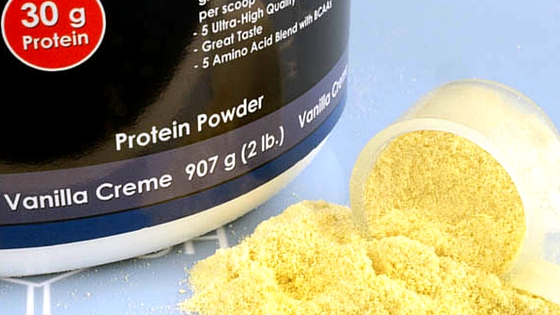These days it seems as if protein powders are everywhere, the grocery store, the drugstore and online. Whether you’re an elite athlete, a weekend warrior or a vegan, everyone is on the protein trend. Because of the high protein content of powder supplements, adding a scoop or two to your smoothies, baked goods, or shakes can aid in weight loss efforts, make you feel “fuller” and preserve lean muscle mass.
While the choices are unlimited, even daunting, not all powders are created equal. Choosing which product is best can be a bit of a workout in itself. There are animal-based powder supplements like eggs, whey and casein (one of the two proteins that make up dairy protein, the other being whey). On the other hand there is a plethora of plant-based forms including pea, hemp, rice and soy. Once you pick the source of the protein, animal or plant, your biggest concern should be what additives the powder has. Many protein powders are loaded with hard to pronounce unnecessary chemicals and artificial sweeteners.
For the animal based protein choices, whey is a dairy derivative. For some dairy or lactose sensitive individuals, whey protein powders may be off the table. However, if you’re not intolerant, milk proteins are some of the best sources of amino acids (the building blocks of protein). According to research milk proteins such as whey and casein have the ability to preserve lean muscle mass and improve metabolic health during weight loss.
When you’re looking for the best animal-based protein powder, keep in mind words like cold processed, concentrate, hormone-free, grass-fed, tested low for heavy metals and does not contain any artificial color, flavor or sweetener. These are all good things.
Pasture-fed cows have a higher concentration of the inflammation reducing omega-3 fatty acids and two to five times more CLA (conjugated linoleic acid) than cows fed with corn or grain. CLA has a bounty of health benefits like aiding in burning fat and maintaining lean body mass. These two sources of dietary fat will also improve absorption of key vitamins. Grass fed cows are less likely to be treated with antibiotics than grain fed cows as well. Recent research shows this may lower the risk of building up antibiotic resistance or gaining unnecessary weight.
Still leary of whey? You can also try egg-white protein, which is naturally low-carb and no-fat. Just like whey, egg white protein has a complete essential amino acid profile, which promotes optimal recovery from challenging workouts.
Casein, as opposed to whey, digests slowly (it’s the same principle as low-glycemic-index or “slow carbs”) and stays in the system longer to nourish muscles. It makes it a good choice for a nighttime snack on workout days because it speeds up recovery and building fat-burning muscle.
For plant based or vegan choices some options are rice, soy, pea or hemp. One of the most popular and widely consumed is soy. This plant based protein contains all essential amino acids, is comparable to whey for promoting muscle growth and contains isoflavones, which have been linked to reducing the risks of heart disease and cancer. But, studies also show that when taken in excess, isoflavones may interact with hormone levels in both men and women. Soy allergies are also common.
To avoid allergies or intolerances, pea protein may be a good answer. It is gluten, dairy, fat and cholesterol free. Although it has similar protein levels to whey and casein, pea protein does lack ample levels of the amino acid cystine .
For the rice option look for sprouted brown rice, not just “rice protein.” Sprouting the rice reduces the amount of carbs and increases the amount of protein, which lowers the glycemic effect (minimizing blood sugar spikes). Like pea protein, rice stacks up to whey in protein per serving amounts and is gluten free but also lacks some essential amino acids, mainly lysine.
Looking for a superfood protein powder? Consider hemp. It is 100% plant based, highly digestible and has high contents of protein and omega 3 and omega 6 fatty acids. The downside? Hemp seeds have a higher calorie and fat count so it may not be the best choice if your goal is primarily weight loss.
Still unsure? There are powders that are plant based blends using hemp, pea, rice and quinoa for for a gluten free, dairy free and soy free supplement that do not have the amino acid deficiencies unlike when they stand alone.
Confused? In the end, it comes down to your ftiness goals, nutritional needs, sensitivities and food preferences. And of course, don’t forget about taste! You can always ask one of our trainers or Nutritional Consultant Kathleen Madden for their thoughts or advice about protein powder supplements.

